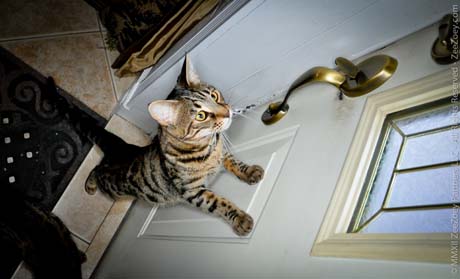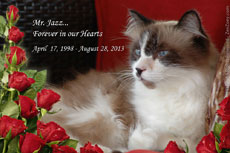Survival Tips to Keep Your Cat Safe, Happy, and Healthy During the Hot Summer Months
I realize it’s been forever since I posted and I wanted to let you know all is well, just many personal and work-related commitments that have been keeping me busy and off the radar. Now that the world is starting to normalize a bit more, I wanted to take a minute to wish everyone a wonderful summer before time escaped me and to share some tips to keep our cats safe, happy, and healthy during this time of year, as they can be adversely affected by the upcoming 4th of July, the searing summer temperatures, and the influx of gatherings that will be occurring in the months to come as we begin to invite more family and friends back into our homes.
4TH OF JULY SAFETY (AND OTHER SUMMER GATHERINGS)
We want to celebrate America’s birthday and our freedoms, but for our cats who are reactive to the slightest change in their environment, a day and night like the 4th of July – something out of their norm – can be especially stressful, traumatic, and dangerous to them. We can’t stop fireworks and celebrations from happening, but with some planning, we can make the holiday more manageable for them.
For your cat’s safety, keep them indoors. If they are indoor/outdoor cats, try to keep them indoors a few days before and after the 4th, as people tend to let off fireworks for days at a time to prolong the holiday. Fireworks can be dangerous to an unsuspecting cat and there are even some ill-intentioned people who will purposely try to harm a cat with fireworks.

Keep doors tightly locked so sneaky or panicky cats can’t get outside.
Even if your cat is an indoor-only cat they could accidentally get out. Guests showing up for a cookout or them hearing unusual noises outside – these types of things can cause even the boldest of kitties to bolt, looking for a safe spot to hide. Be careful when you or guests go in and out – double-check that doors are securely latched and that window screens don’t have any tears. Make sure their identification is current and that you have a picture of them. It’s easy for a kitty to slip out the door while in a panicky state and end up lost, injured, or worse.
Set up a sanctuary room for your cat that includes safe hiding places and food, litter, etc. prior to nightfall so it’s ready for them. You could also try pheromone therapy to de-stress your cat (such as a product like Feliway spray), and playing music or having a television on to diffuse noises. If these suggestions don’t work and your cat is unable to remain calm, don’t leave them alone if you plan on watching fireworks. Hire a pet sitter if need be, or ask a neighbor to stay while you go out.
Be aware that picnic foods and alcohol are NOT appropriate for kitty and can cause problems ranging from mild stomach upset to extreme toxicity. Glowsticks that people use outdoors at night can cause irritation if chewed by a curious cat and unless you’ve been instructed by your veterinarian, do not give your cat any calming medication, as you don’t know what side effects may occur or how your cat may react to a particular medication the first time it’s administered.
Make adjustments to your cat’s feeding schedule if need be. Some cats are given a small meal or snack before bedtime and the loud noises from fireworks that intensify after dark can cause even the hungriest cat to run for cover. If your cat is spooked and does hide, be patient and don’t force them out of hiding. Typically they will come out on their own when they feel the coast is clear and safe, but not during the celebrations.

Rolz is our Houdini cat and can vanish for hours when he’s stressed. He’ll magically reappear when he feels it’s safe to come out.
KEEPING YOUR CAT COOL DURING SUMMER HEATWAVES
Temperatures are hitting record highs across the country and it’s only going to get hotter. To help keep your cat calm, cool, and comfortable, here are some basic tips for your feline to survive the summer heat:
Recognize the signs of heatstroke. Heavy panting, glazed eyes, a rapid heartbeat, difficulty breathing, excessive thirst, lethargy, fever, dizziness, lack of coordination, profuse salivation, vomiting, a deep red or purple tongue, seizure, and unconsciousness are all possible symptoms of heatstroke from extreme temperatures. Cats that are older, very young, overweight, not conditioned to prolonged exercise, or have heart or respiratory disease can be especially susceptible.
According to the Humane Society of the United States (HSUS), if your cat is suffering from heatstroke, immediately move them into the shade or an air-conditioned area. Apply ice packs or cold towels to their head, neck, and chest, or run cool (not ice cold) water over them. Let them drink small amounts of cool water or lick ice cubes and then take them directly to a veterinarian as heatstroke is considered an emergency.
Limit playtime and exercise to morning or evening during the cooler hours of the day. This is especially important for young kittens and seniors, both of whom are vulnerable to heatstroke. If your cat has just eaten, make sure you give them time to digest their food before you begin playtime.
Let your cat find cool spots in the house that have access to rooms without much sun or have tile floors and brush your cat often. A well-groomed, tangle-free coat will help to keep your cat clean and cool.

Not only does grooming your cat help to keep them cool, but it also enhances the bond you share with them.
Keep mealtimes quick and fresh. Do not leave food out for too long, especially for outdoor or feral/community cats. According to Alley Cat Allies, after about 30 minutes, bugs will start to show up, so picking up uneaten food after roughly 45 minutes helps prevent that. They also recommend you feed cats dry food in the summer as it attracts fewer insects. If giving wet food, add water for extra hydration and to keep it from drying out. They also suggest you consider investing in an ant-proof bowl or create your own “ant barrier” by surrounding the bowl with baking soda or a line of food-grade diatomaceous earth without chemical additives.
Water and hydration are always important for cats, but extra water is essential in hot weather. Keep water dishes filled will fresh, cool water, adding ice cubes if the kitty likes that, and place water bowls in shaded areas, out of the direct sun. To slow evaporation, use a bowl that is narrow but deep to reduce the bowl’s surface area. For indoor cats, consider a water fountain, as they provide a constant stream of water, inspiring cats to drink more. Offer cool treats as an alternative, too, such as this recipe for catsicles from Petfinder.com.

When meals are done, the dishes are clean and empty but the water dish remains full and frequently changed with cool water.
If you perform Trap-Neuter-Return (TNR) during the summer, take the high temperatures into account and do not leave cats in traps. Once the cat is trapped, keep them in the shade with a trap cover or in an air-conditioned space so they don’t get dangerously overheated. And under no circumstances should you ever leave a trapped cat or your pet cat in a parked car. Not even with the car running and the air conditioner on.
According to the HSUS, “on a warm day, temperatures inside a vehicle can rise rapidly to dangerous levels. On an 85-degree day, for example, the temperature inside a car with the windows opened slightly can reach 102 degrees within 10 minutes. After 30 minutes, the temperature will reach 120 degrees. Your pet may suffer irreversible organ damage or die.” Furthermore, do not let your cat out onto surfaces that get extremely hot from the sun, such as asphalt, as the metal can absorb the heat and burn your cat’s paws, and don’t place TNR traps on hot surfaces either, as the trap can become an oven.
Lastly, be prepared. Before a summer storm takes out the power in your home (or rescue facility), create a disaster plan to keep your precious feline safe from heatstroke or other temperature or summer-related disaster issues. The HSUS has a thorough guide you can access here for details.
Take care all and have a safe and happy summer!



























thanx for de tipz guyz ! hope everee onez safe and healthee and happee and de wee gran
babee iz doin awesum lee grate~ 🙂 ♥♥
Along with Halloween, the 4th is my least-favorite holiday for all of the reasons you mention. Sharing to socials with gratitude.
Those are good tips! They heat is awful, but we do feed our ferals wet food for a while in the morning and evenings but they have lots of dry food. We put the wet food in a moat bowl since ants can’t swim they can’t get to the food.
Great advice, I never thought about blankets, good idea! Happy 4th!
Excellent tips. Happy 4th!